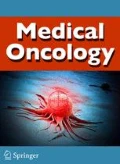Abstract
Sorafenib is an oral multikinase inhibitor approved for the treatment of hepatocellular carcinoma (HCC). In two randomized trials, sorafenib was reported to be safe without a significant impact on quality of life (QoL). The aim of this study was to evaluate the occurrence of adverse events, QoL variations, and treatment discontinuations in HCC patients treated with sorafenib. Between November 2009 and March 2011, all patients evaluated as suitable for sorafenib treatment were enrolled. Every patient was invited to complete the Functional Assessment of Cancer Therapy–Hepatobiliary Questionnaire before starting therapy, at week 1, and at months 1 and 2. QoL scores were analyzed by the Wilcoxon matched-pairs test. Side effects were classified according to the Common Terminology Criteria for Adverse Events v.3.0. Thirty-six patients were enrolled. The cumulative incidence of therapy discontinuation for drug-related adverse events was 33 % (95 % confidence interval, 20.2–49.7). The most common adverse event was fatigue (66.7 %). The worst score decrease was detected from baseline to week 1 in physical well-being, with a median reduction of −8.3 (range −60.1 to 17.9; P = 0.0003). Treatment withdrawal from adverse events was higher than previously reported, significant QoL decrease occurred, and estimated feasibility was 66.7 %.




Similar content being viewed by others
References
Nordenstedt H, White DL, El-Serag HB. The changing pattern of epidemiology in hepatocellular carcinoma. Dig Liver Dis. 2010;42:206–14.
Llovet JM, Brù C, Bruix J. Prognosis of hepatocellular carcinoma: the BCLC staging classification. Semin Liver Dis. 1999;19(3):329–38.
Bruix J, Sherman M. Management of hepatocellular carcinoma. Hepatology. 2005;42:1208–36.
Bruix J, Sherman M. Management of hepatocellular carcinoma: an update. Hepatology. 2011;53(3):1020–2.
Abou-Alfa GK, Schwartz L, Ricci S, Amadori D, Santoro A, Figer A, De Greve J, Douillard JY, Lathia C, Schwartz B, Taylor I, Moscovici M, Saltz LB. Phase II study of sorafenib in patients with advanced hepatocellular carcinoma. J Clin Oncol. 2006;24(26):4293–300.
Llovet JM, Ricci S, Mazzaferro V, Hilgard P, Gane E, Blanc JF, Cosme de Olivera A, Santoro A, Raoul JL, Forner A, Schwartz M, Porta C, Zeuzem S, Bolondi L, Greten TF, Galle PR, Seitz JF, Borbath I, Häussinger D, Giannaris T, Shan M, Moscovici M, Voliotis D, Bruix J. Sorafenib in advanced hepatocellular carcinoma. N Engl J Med. 2008;359:378–90.
Cheng AL, Kang YK, Chen Z, Tsao CJ, Qin S, Kim JS, Luo R, Feng J, Ye S, Yang TS, Xu J, Sun Y, Liang H, Liu J, Wang J, Tak WY, Pan H, Burock K, Zou J, Voliotis D, Guan Z. Efficacy and safety of sorafenib in patients in the Asia-Pacific region with advanced hepatocellular carcinoma: a phase II randomized, double-blind, placebo-controlled trial. Lancet Oncol. 2009;10:25–34.
Child CG III, editor. The liver and portal hypertension. Vol. 1 of Major problems in clinical surgery. Philadelphia: W. B. Saunders; 1964. p. 50–64.
Pugh RN, Murray-Lyon IM, Dawson JL, Pietroni MC, Williams R. Transection of the esophagus for bleeding oesophageal varices. Br J Surg. 1973;60:646–9.
Yount S, Cella D, Webster K, Heffernan N, Chang CH, Odom L, van Gool R. Assessment of patient-reported clinical outcome in pancreatic and other hepatobiliary cancers: the FACT Hepatobiliary Symptom Index. J Pain Symptom Manag. 2002;24(1):32–44.
Heffernan N, Cella D, Webster K, Odom L, Martone M, Passik S, Bookbinder M, Fong Y, Jarnagin W, Blumgart L. measuring health-related quality of life in patients with hepatobiliary cancers: the Functional Assessment of Cancer Therapy-Hepatobiliary Questionnaire. J Clin Oncol. 2002;20:2229–39.
Trotti A, Colevas AD, Setser A, Rusch V, Jaques D, Budach V, Langer C, Murphy B, Cumberlin R, Coleman CN, Rubin P. CTCAE v3.0: development of a comprehensive grading system for the adverse effects of cancer treatment. Semin Radiat Oncol. 2003;13(3):176–81.
Oken MM, Creech RH, Tormey DC, Horton J, Davis TE, McFadden ET, Carbone PP. Toxicity and response criteria of the Eastern Cooperative Oncology Group. Am J Clin Oncol. 1982;5:649–55.
Lencioni R, Llovet JM. Modified RECIST (mRECIST) assessment for hepatocellular carcinoma. Semin Liver Dis. 2010;30(1):52–60.
Welker MW, Lubomierski N, Gog C, Herrmann E, Engels K, Vogl TJ, Bechstein WO, Zeuzem S, Trojan J. Efficacy and safety of sorafenib in advanced hepatocellular carcinoma under daily practice conditions. J Chemoter. 2010;22(3):205–11.
Spinzi G, Terreni N. Health-related quality of life and sorafenib. Hepatology. 2010;52(4):1523.
Bukowski R, Cella D, Gondek K, Escudier B. Effects of sorafenib on symptoms and quality of life results from a large randomized placebo-controlled study in renal cancer. Am J Oncol. 2007;30:220–7.
Miyake H, Kurahashi T, Yamanaka K, Kondo Y, Takenaka A, Inoue T, Fujisawa M. Impact of sorafenib on health-related quality of life in Japanese patients with metastatic renal cell carcinoma: a prospective evaluation. BJU Int. 2010;106(11):1643–7.
Cella D. Beyond traditional outcomes: improving quality of life in patients with renal cell carcinoma. Oncologist. 2011;16(2):23–31.
Iyer R, Fetterly G, Lugade A, Thanavala Y. Sorafenib: a clinical and pharmacologic review. Expert Opin Pharmacother. 2010;11(11):1943–55.
Conflicts of interest
Nothing to disclose.
Author information
Authors and Affiliations
Corresponding author
Rights and permissions
About this article
Cite this article
Brunocilla, P.R., Brunello, F., Carucci, P. et al. Sorafenib in hepatocellular carcinoma: prospective study on adverse events, quality of life, and related feasibility under daily conditions. Med Oncol 30, 345 (2013). https://doi.org/10.1007/s12032-012-0345-2
Received:
Accepted:
Published:
DOI: https://doi.org/10.1007/s12032-012-0345-2




